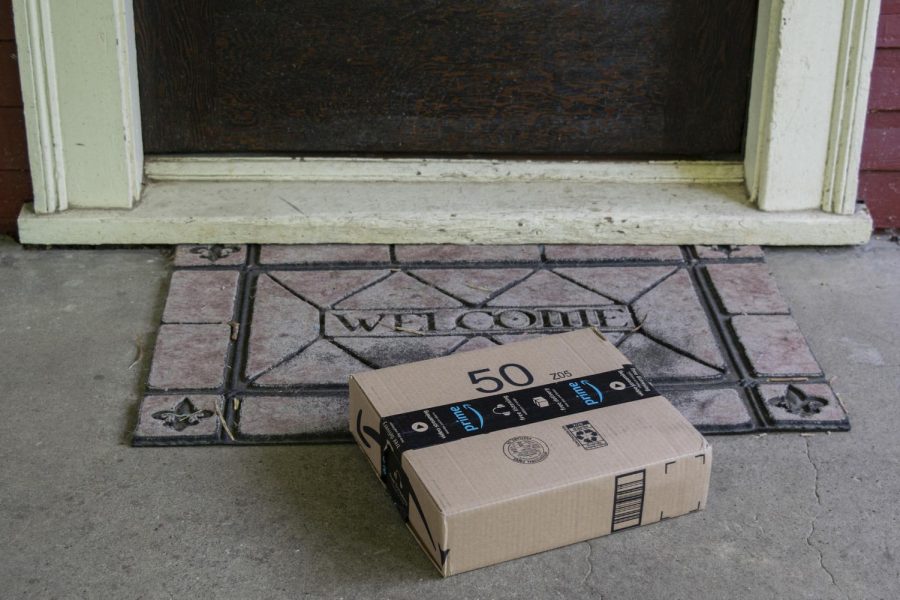COVID-19 Concerns Include Shipping, Shopping and Company Shutdowns
As stay at home orders keep people inside, many have started getting their goods delivered to them
Package and shipping guilt, stimulus check distribution and online sales are all wrapped up in the new COVID-19 centered marketing strategies employed by fashion brands. These factors usually go unnoticed in the scrolling and ease of online shopping but are now at the forefront of the consumer’s mind.
The question of whether it is safe to ship items is a high concern for online stores, the shipping industry and consumers. According to the Centers for Disease Control, however, while much is still not known about how COVID-19 can spread it is “unlikely to be spread from domestic or international mail, products or packaging.”
With little access to localized shopping, online methods are the only way for many to shop at the moment—specifically for nonessentials. Between the safety of the consumer and the safety of the delivery workers, shopping online is bringing up guilt surrounding essential services.
Seattle University Biology major Juliana Andrade is the Resident Housing Association Sustainability Representative for Xavier Residence Hall. She is trying to avoid online shopping at home in Hawaii, where so many essentials are already imported.
“On Amazon, you have the option to minimize the packaging you use. While you’re still using packing and all the resources it takes to send it, at least you’re minimizing it,” Andrade said.
The Amazon option, labelled frustration-free packaging, reduces unnecessary packaging and aims to be more eco-conscious, an option Andrade advises for those still utilizing the resource.
Sales are also popping up on sites that haven’t ever held sales before. Everlane kicked off their first sale with $50 denim, supposedly “breaking their own rules” about unwavering, transparent pricing. Never once has the brand employed site-wide sales, and used weekly promotions to “make its everyday basics even more affordable for budget-conscious shoppers,” according to the Huffington Post.
Other prominent fashion brands including Neiman Marcus and True Religion have filed for bankruptcy in wake of the wave of stay-at-home orders and before rolling out any online sales. In the midst of a pandemic, however, the relevancy of luxury goods is not a point of interest for many consumers.
Brand importance may not be prioritized alongside essential items, and some predictions point to many malls and high-end retailers failing shortly after COVID-19 quarantining ends. Until then, fashion retailers will try and maintain brand relevance, hoping for a resurgence when the economy begins to repair.
The stifling of brand-centered retailers raises another question: what are people actually buying in quarantine, if non-essential?
Sales in liquor and at-home workout equipment— specifically the Mirror, a virtual workout experience— have seen incredible growth. According to Vox, consumerist habits are still persisting online through tough times, but the motivating forces are the need for control and coping mechanisms for different mental illnesses. With social media perpetuating internet jokes about the monotony of the days and reliability of a single pair of sweatpants, online sales are still relentlessly flooding people’s inboxes to stimulate purchases.
Fashion Nova, a largely-online American fast-fashion retailer, sent a text to their subscribed customers with a sale announcement, beginning the message with “When the Stimulus Deposit Hits,” treating the stimulus checks as a shopping incentive rather than essential funds. Some viewed this as an insensitive marketing ploy, making a mockery of a situation in which some people have died and many others are financially struggling.
With many unemployed, the morality of sales and ads is dubious, especially when many are struggling to meet rent and basic living expenses.
Some people, including Andrade, see companies’ continued marketing ploys during the pandemic as questionable—as they are essentially profiting from a national crisis—while often framing the sales as a way for the consumer to better themselves.
“I think it’s really interesting, because it’s almost like a new-year’s-resolution type of advertisement, especially for running and exercising things. The funniest thing to me are the car ads, saying ‘we stand with you, come get a car,’ but do I really need one right now?” Andrade said. “The most successful businesses coming out of this are the ones that are adapting to it.”
Things are obviously unclear in every aspect of the human experience right now. From what is worn to what is bought and what people are skipping out on, the COVID-19 pandemic seems to be shaping a new economic landscape.


